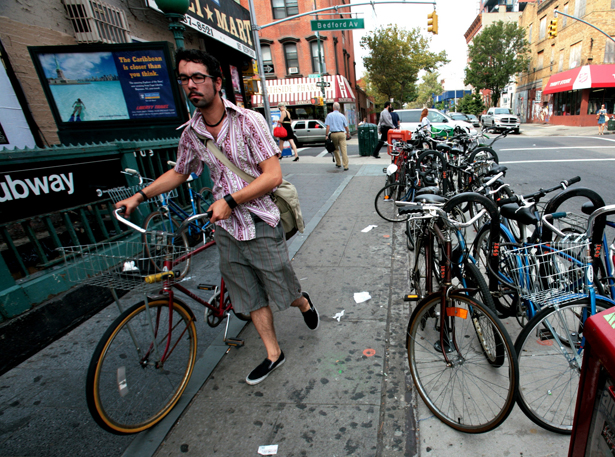 This week’s long-overdue unveiling of New York City’s bike-sharing program—we need not promote its bank-derived name—has led some to herald the dawn of a new era. “Bicycling, the most efficient form of urban transportation ever designed, is now available when people need it,” wrote Oregon Representative Earl Blumenauer, chair of the Congressional Bike Caucus, in the New York Post. “I could not be more excited for you.”
This week’s long-overdue unveiling of New York City’s bike-sharing program—we need not promote its bank-derived name—has led some to herald the dawn of a new era. “Bicycling, the most efficient form of urban transportation ever designed, is now available when people need it,” wrote Oregon Representative Earl Blumenauer, chair of the Congressional Bike Caucus, in the New York Post. “I could not be more excited for you.”
What’s lost in these celebrations is the longer history of the bicycle not just as an instrument for exercise or leisure, but as an extraordinarily practical way to get around cities. In the decades before and after the turn of the twentieth century—between its popularization in the mid-1880s and the rise of the automobile in the interwar period—the bicycle enjoyed what some historians have called a “golden age.” Rollin Kirby, the first-ever winner of the Pulitzer Prize for Editorial Cartooning in 1922, wrote an article for The Nation in 1931, “An Echo of Wheels,” remembering an era when “the world world was awheel, men, women, and children” and “every town had a bicycle club.”
Kirby began to reminisce after seeing an article in the New York World announcing the dissolution of a bicycle club in Newburgh, New York, which had finally resigned itself to the obvious fact “that the bicycle craze would never come back.” For decades past the bicycle’s apparent peak, Kirby wrote,
they went on hoping that [automobiles] might be only a passing fancy; that when the public was tired of being whirled at forty miles an hour along the roads and the novelty of effortless locomotion had worn off, once more sanity would return and they might with safety venture off on a modest club run…Doubtless they argued a bicycle was safer, less noisy, cheaper, healthier than an automobile and that facts so self-evident must, in the long run, bring people to their senses.
From Kirby’s vantage point, that was never going to happen. He found much to mourn in the passing of the bike-friendly world:
I do not know whether it was a better world than the one I now inhabit, but I am certain it was a more leisurely one and decidedly a quieter one. It seems, as I look back on it, a healthier one, although the statisticians tell me the span of human life has been extended since then. The deaths on the highways were trifling then as compared with those of the motor age, and although life, gauged by the ingenious but inconclusive graphs the actuaries present, may have been shorter, it most assuredly was safer on the main roads.
Two years later, The Nation’s anonymous columnist The Drifter—supposedly a pseudonym for the literary editor, Carl Van Doren—expressed some hope that because “the craze for speed might be nearing an end,” the bicycle could someday achieve a comeback. While some considered the bike “extinct” as a mode of transportation, The Drifter reported, the Netherlands maintained special bike paths on certain highways; certain bike-friendly associations in the United States had even attempted to introduce bills into state legislatures “calling for the setting aside of three or four feet on public roads for the use of cyclists.” Clearly, those were the ideological forebears of those contemporary bike-lane proponents whom the Republican gubernatorial candidate in Colorado in 2010 claimed were trying to “threaten our personal freedoms.”
Some eighty years later, the bicycle has indeed enjoyed a renaissance in cities around the United States and the world. Part of this is due to the inherent populism of the bicycle, Nation contributing writer Ben Adler wrote in “Wheels of Progress” in 2011:
When it comes to combating greenhouse gas emissions, obesity and other hazards of modern life, bike lanes are not a panacea. But they’re a good place to start. Eventually, they can help reshape not just our concept of the city and its streets but the way residents define themselves.
* * *
Subscribers to The Nation can access our fully searchable digital archive, which contains thousands of historic articles, essays and reviews, letters to the editor and editorials dating back to July 6, 1865.


